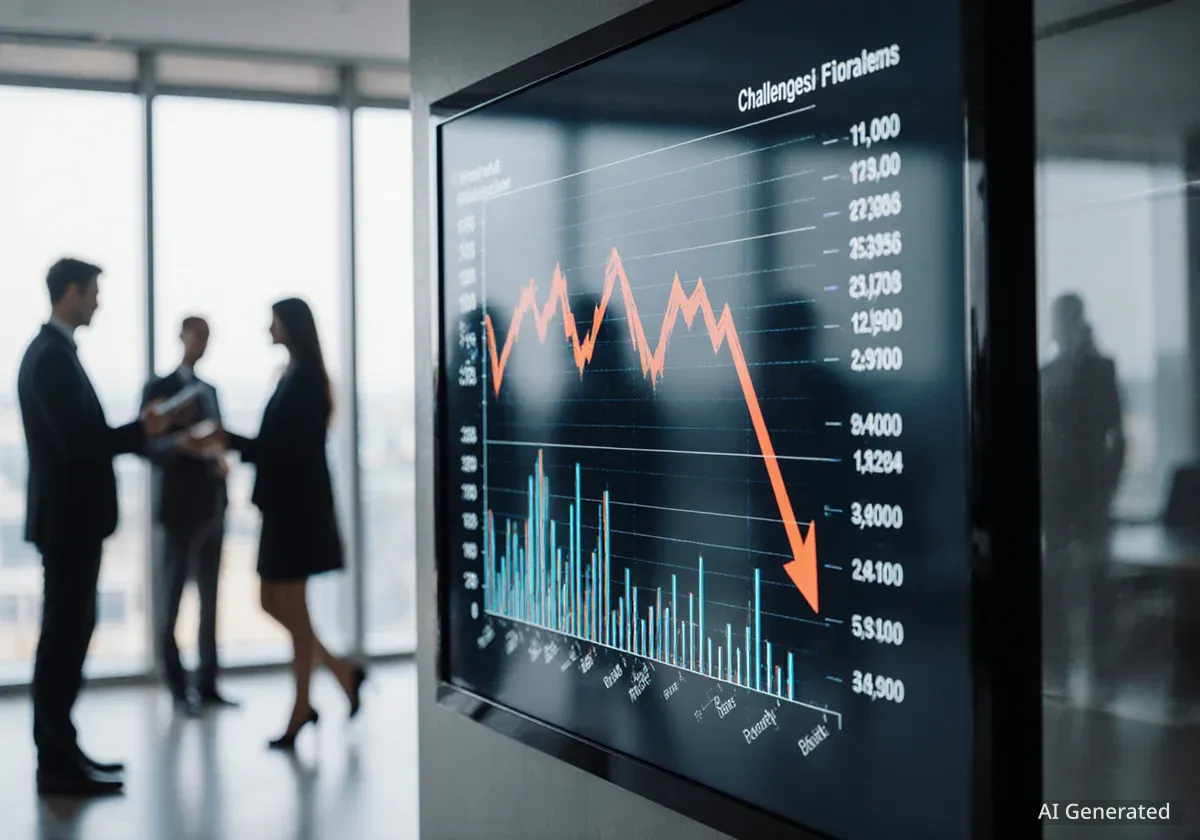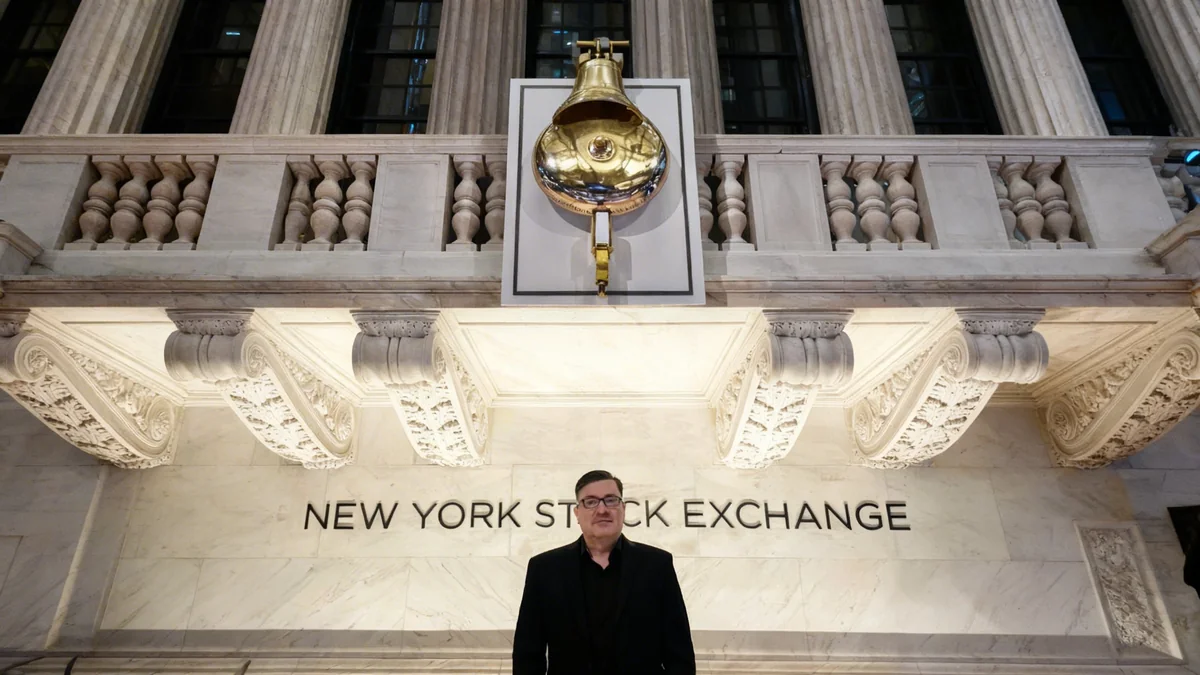Wall Street is experiencing significant fluctuations as investors balance strong corporate earnings and enthusiasm for artificial intelligence against persistent concerns over international trade disputes and future economic policy. Major indices like the Dow Jones Industrial Average have seen dramatic swings, reflecting a market grappling with conflicting signals and widespread uncertainty.
As a new earnings season begins, major financial institutions are reporting robust results, providing a potential anchor for the market. However, the looming threat of escalating tariffs and questions about the Federal Reserve's next moves are creating a complex and challenging environment for both individual and institutional investors.
Key Takeaways
- Major stock indices are showing significant daily volatility, with large gains often following steep losses.
- The earnings season has started on a positive note, particularly for large banks, boosting investor confidence.
- Enthusiasm for Artificial Intelligence (AI) continues to be a primary driver of growth in the technology sector and beyond.
- Renewed threats of tariffs on international goods, particularly from China, are a major source of market anxiety and uncertainty.
- Investors are closely watching for signals from the Federal Reserve regarding future interest rate decisions and monetary policy.
Earnings Season Provides an Early Boost
The latest corporate earnings season kicked off with strong performances from several of Wall Street's largest banks. Analysts had anticipated solid results, and the initial reports have largely met or exceeded those expectations. This positive news has provided a much-needed lift to the market after periods of sharp decline.
For example, JPMorgan announced plans for significant investments, signaling confidence in the U.S. economy. The bank stated it will invest up to $10 billion in American companies deemed essential to national security. Such commitments from financial leaders can have a stabilizing effect on market sentiment.
The performance of these banking giants is often seen as a barometer for the health of the broader economy. Strong earnings suggest that both corporate and consumer financial activity remains resilient despite macroeconomic headwinds.
Did You Know?
Earnings season is the period, typically lasting several weeks, when a majority of publicly traded companies release their quarterly financial reports. These reports are critical as they provide a direct look at a company's profitability and future outlook.
The Double-Edged Sword of Artificial Intelligence
The rapid advancement and adoption of artificial intelligence continue to be a dominant theme on Wall Street. Companies associated with AI, from chipmakers like Nvidia to software developers, have seen their stock values surge. The release of smaller, more accessible supercomputers is aimed at broadening access to AI development, potentially fueling further innovation and growth.
Many analysts believe AI will be a primary engine for stock market growth for the foreseeable future, with some reports suggesting that companies are consistently surpassing earnings expectations due to AI-driven efficiencies and new product offerings. Nvidia's stock, for instance, reached a record high following reports that the U.S. had cleared billions in chip exports, highlighting the sector's global demand.
Bubble Concerns Emerge
However, the rapid rise in AI-related stocks has also sparked debate and concern among some market watchers. The phenomenon of AI companies investing heavily in other AI companies has raised alarms about a potential speculative bubble, drawing comparisons to the dot-com boom of the late 1990s.
"Very speculative, very frothy, very greedy," one Wall Street analyst commented, describing the current market sentiment around AI stocks. While experts believe long-term investments in the sector are sound, they caution that a short-term correction is possible if valuations become detached from fundamentals.
This creates a dilemma for investors: balancing the immense long-term potential of AI against the short-term risks of a market that some describe as overheated.
Trade Tensions and Tariff Threats Roil Markets
Perhaps the most significant source of market volatility has been the re-emergence of trade disputes. After a period of relative calm, renewed threats of significant tariffs have sent shockwaves through global markets, causing steep sell-offs. The Dow has experienced drops of 500 to 800 points on days when tariff rhetoric has intensified.
The White House has signaled a willingness to impose substantial new tariffs on Chinese goods, with some proposals suggesting rates as high as 100%. In response, China has warned of retaliation and urged the U.S. to de-escalate, creating a tense standoff that directly impacts multinational corporations and global supply chains.
The Impact of Tariffs
Tariffs are taxes imposed on imported goods. They can lead to higher prices for consumers, disrupt supply chains for businesses, and reduce overall economic activity. The uncertainty surrounding tariff policy makes it difficult for companies to plan for the future, which often leads to stock market volatility.
The business community has voiced its concerns directly. A survey of CEOs revealed that 86% were considering raising prices in direct response to tariffs, a move that could fuel inflation and dampen consumer spending. These trade tensions create a direct conflict with the positive momentum from strong earnings and AI growth.
Economic Indicators and Consumer Sentiment
Beneath the daily market movements, underlying economic data presents a mixed picture. The U.S. Treasury Secretary noted a lower deficit-to-GDP ratio for the 2025 fiscal year and expressed optimism for 2026. This suggests some level of fiscal stability.
However, consumer sentiment remains a concern. Recent data shows that consumer confidence is near multi-year lows, with many Americans worried about job prospects and rising prices. The CEO of GoFundMe noted a troubling trend of more people using the platform to crowdfund for basic necessities like groceries, indicating that economic strain is being felt at the household level.
Government Shutdowns Add to Uncertainty
Past and potential government shutdowns have also contributed to the economic uncertainty. Shutdowns can disrupt key government services, delay economic data releases needed by the Federal Reserve, and impact federal loan programs. For example, a popular 0% down mortgage program was reportedly thrown into disarray during a shutdown, leaving homebuyers in limbo. The delays in farm bailout payments also highlighted the real-world consequences of political gridlock.
Looking Ahead: The Federal Reserve and Investment Strategy
Investors are keenly focused on the Federal Reserve's next steps. Minutes from recent meetings suggest that officials may be divided on the future path of interest rates. While some indicators point toward potential rate cuts to support the economy, inflationary pressures from tariffs and strong wage growth could complicate that decision.
This uncertainty has led investors to explore various strategies to protect their portfolios.
- Diversification: Many are looking beyond traditional stocks and bonds. Investments in precious metals like silver, platinum, and palladium are being considered as alternatives to gold.
- Premium Brands: Early earnings reports suggest that companies with premium products and strong brand loyalty are performing well, as they are better able to pass on increased costs to consumers.
- Real Estate: Real Estate Investment Trusts (REITs) offer another avenue for diversification. Companies like Ventas, with a portfolio of healthcare properties, and Essex Property Trust, focused on residential apartments, provide exposure to different sectors of the property market.
Ultimately, the market remains at a crossroads. The powerful tailwinds of technological innovation and solid corporate profits are battling the significant headwinds of geopolitical tension and economic uncertainty. How these forces resolve will determine the direction of Wall Street in the months to come.





